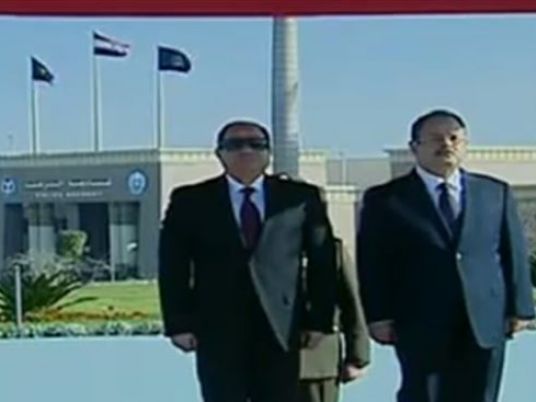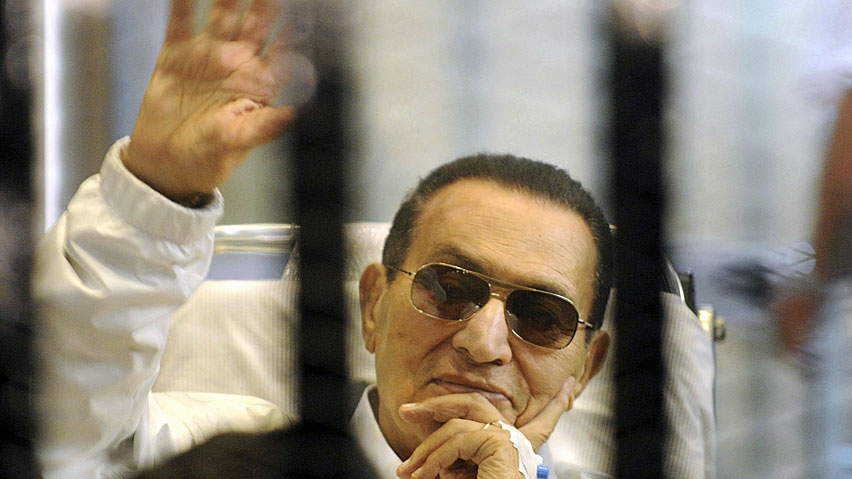Over the past twelve days, the demonstrations have dominated Egyptian television. But not all coverage has been equal. In fact, images of the protests broadcast on state-run television–including channels 1, 2 and Nile TV–compared to the dominant independent channel, Al Jazeera, has created a kaleidoscope of contradictory information, compounding fervor and confusion on the ground.
State TV, long the mouthpiece of the regime, remains so, reflecting Mubarak's current defensive, untruthful, and beleaguered state. Al Jazeera, meanwhile, struggles to work in the face of intense government crackdowns. In covering the battle on the ground, the opposing channels have been embroiled in a war of their own.
Facebook and Twitter might be the media keywords in these "Days of Anger," but in Egypt, television dominates as a way of disseminating information; it is why protests went on even when the government shut down the Internet and cell phone service. Al Jazeera's coverage has been characterized by its scope and commitment, as well as its timeline: on Friday, 28 January, while state TV ignored the protests, Al Jazeera broadcast constant live footage from the 6th of October bridge.
Ayman Moheyldin, a Cairo based correspondent for Al Jazeera, has been covering the protests since the very beginning. On that first game-changing Friday–what he refers to as Al-Jazeera's "Gulf War moment"—the network had reporters on the ground in Suez, Cairo and Alexandria. They had live capabilities in all locations, and were the first to broadcast live from Tahrir Square, which remains the focal point of ongoing demonstrations. Moheyldin has spent many nights in Tahrir himself, contributing to the uninterrupted coverage that has made Al Jazeera the leader in the broadcast wars–and also the target of most of the Mubarak regime's ire against journalists.
Last week, following the intense coverage of the demonstrations, Al Jazeera's Cairo office was shut down by the Egyptian government. Their licenses were revoked, equipment confiscated, and a total of nine staff members arrested and many more harassed. They continued to broadcast from makeshift locations, and their banned coverage was projected onto a large tarp in Tahrir Square, where thousands of protesters watched.
Then, on Friday, 4 February, the offices were torched. Threats against journalists of all news agencies have intensified over the past week, but none quite so much as those against Al Jazeera. The obstacles have made reporting, for Moheyldin at least, "more determined." (There were reports today of Moheyldin's arrest, his second since the protests began.)
Yet work continues–"We've been covering this story for years," he told Al-Masry Al-Youm–and, although measures like the removal of the Al Jazeera logo from the microphone have made things slightly more secure for the correspondents, it's only meager protection against increasing public ire toward the station, ire which has been stoked by Al Jazeera's nemesis, state television.
Over the past twelve days, state television has been providing skewed coverage or willfully ignorant non-coverage of the demonstrations that has amounted to unabashed propaganda. Broadcasts have attempted to evidence some of the most destructive rumors: that protesters morphed into looters as soon as police were withdrawn; that foreign journalists were part of a conspiracy to overthrow the government; that the majority of Egyptians, Mubarak supporters, are being bullied and intimidated by thuggish activists whose uprising has paralyzed Egypt's economy. One protester described state TV to Moheyldin this way: "It would make Nazi propaganda chief Joseph Goebbels proud."
Paul Geday, an artist and curator based in Cairo, has been following the protests on Al Jazeera and Al Arabiya (another Arabic-language satellite news channel), but turned to state TV out of curiosity. What he saw flabbergasted him. The channels–which had ignored the protests altogether initially–now broadcast "patriotic songs from the 60s and 70s, spots for the Ministry of Tourism, and Mobinil commercials." It was, he told Al-Masry Al-Youm, "completely surreal."
Gamal Eid works for the Arabic Network for Human Rights Information, an NGO that monitors the media and freedom of expression in Egypt. State TV, he told Al-Masry Al-Youm, reported that the protests consisted of "huge numbers out in support of Mubarak" and described them as supporting "stability"; the word "democracy," Aeed said, was never uttered. When he tuned in on Friday, correspondents were still equating the uprising with a "foreign conspiracy," and that the protesters were cheaters and thieves.
Many of the state channels feature calls from viewers, and it is during these segments–which, by nature, should reflect a panorama of views–that the channels' bias comes to the forefront. Ninety percent of the callers support Mubarak, one viewer estimated to Al-Masry Al-Youm, and the small portion of them who want him to leave are content that he do so in September. Some emotionally refer to Mubarak as "our father" and denounce protesters for ruining him. A few days ago, the viewer noted, the channels began to directly assert a foreign conspiracy, which they tied to Israel. It's a "charade," she said.
But it hasn't just been the past twelve days that has exposed the biased and obsolete agenda of Egyptian state TV–that's been happening gradually for the last 15 years. The model for controlling a people, once a great tool, is "locked in the past, in a world where the government controls the message," according to Lawrence Pintak, a professor, former journalist, and the author of forthcoming book "The New Arab Journalist: Mission and Identity in a Time of Turmoil."
In size, Pintak told Al-Masry Al Youm, no other state television in the world rivals Egypt's, and in influence only Saudi Arabia's comes close. But the Mubarak regime's continued reliance on state channels to control public opinion reflects a naive clinging to bygone days before satellite television. The government can't design the message anymore, Pintak said, but it can "take the edge off of some of the coverage"–or at least it can try.
According to Pintak, the role of journalists in the Arab world has changed dramatically since he was a correspondent in the 1980s. Then, most journalists had to work under tight restrictions from governments, which they had little power to challenge. But Arab journalists are steadily beginning to work unencumbered, and Al Jazeera has been critical in providing a platform for them.
The recent defection of two major Nile TV correspondents–Shahira Amin and Soha al-Nakash–over their government-run channel's biased coverage is a "microcosm of what has happened in Arab journalism in the past 15 years." News media in Egypt are "weapons of war," said Pitnak. "Government media is a weapon of pro-Mubarak people; the majority of the rest of the media have become weapons of people."
Attempts to intimidate journalists into halting their coverage of the protests, whether by threats or detention, will likely work against the regime. As of now, they have only served to further galvanize non-state media, said Pintak. "As journalists, we're human beings. Once they start shooting at you or beating you up, it's hard not to take it personally. It is no longer objective, unbiased coverage. It has become a struggle between media–Arab and Western–and Mubarak."
Still, for a long time, the advantage was with state TV. Even with the introduction of satellites–Cairo's skyline is a rash of satellite dishes–they managed to stay relevant by appealing to the viewers' already held notions, their patriotism, and by providing essential information, like which ATMs were open, what time curfew starts, and when the president is scheduled to speak.
During the uncertainty of the past twelve days, these services meant that even viewers who would not choose to tune in to state TV had to watch it, providing an opportunity for the channels to convey their biased coverage, which Pintak calls "fear-mongering." And one strong message, that the protesters are crippling the country, closing jobs and stalling paychecks, rings loudly in the households of many poor Egyptians, whose lives have been further challenged by the current state of uncertainty.
But now, state TV seems to be losing ground. In addition to the defection of Amin and al-Nakash, some characterize the channels' coverage of Friday's massive, peaceful protests as more reflective of the truth on the ground, and less beholden to the agenda of denial. Whereas last week state television may have chosen to broadcast touristic shots of an untouched rural Egypt, or the loud declarations of Mubarak supporters, on Friday, they panned the masses of protesters occupying Tahrir.
These concessions, Pintak asserts, may have more to do with practicality than ideology. "If I'm a top official at state TV, I'm looking at my own future. I'm looking at the political tea leaves, which way is the wind blowing, and which direction I'm set to blow in."
Perhaps most indicative of the changing face of Egyptian television is Shahira Amin, whose departure after twelve years at Nile TV drew attention to the network's habit of prioritizing regime solidity over truth. Her resignation became a news story in and of itself, and when she told it to the media, she did so live from Tahrir Square–in an interview with Al Jazeera.




